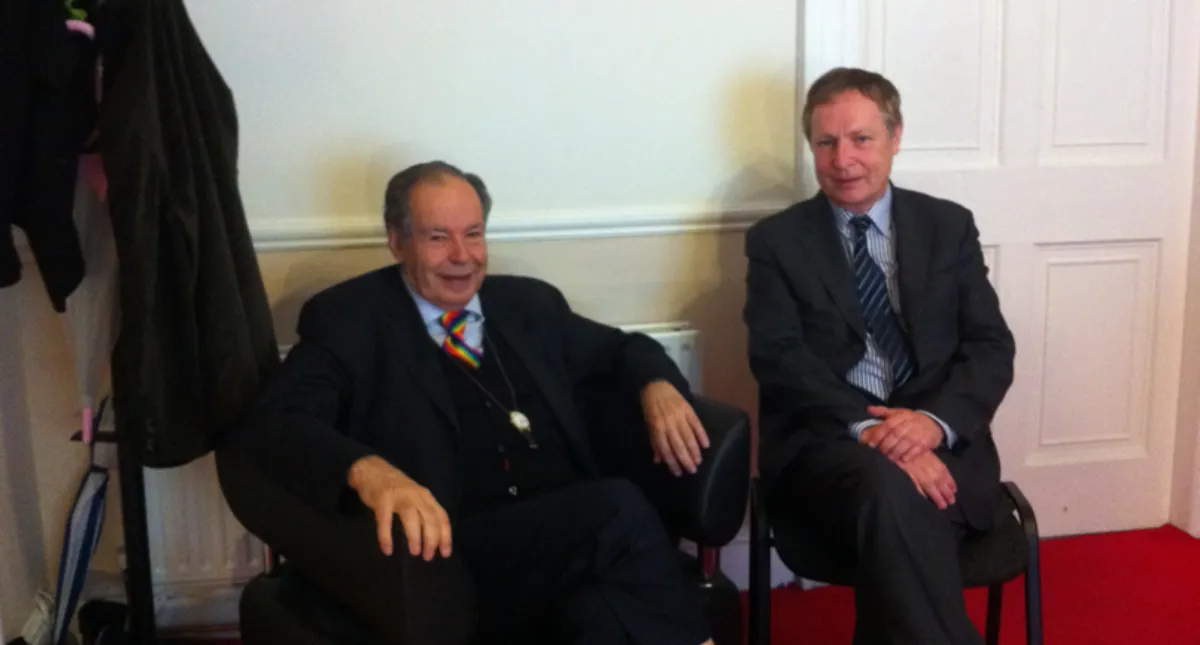Edward de Bono with Ed Naughton
Ed Naughton, Director General of the Institute of Project Management of Ireland, had the pleasure of meeting with Edward de Bono in Dublin in November this year at the headquarters of the institute.
Edward de Bono has been named one of the 250 people who have contributed most to humanity. He has chaired a special summit of Nobel Prize laureates. He is regarded as the leading international authority in creative thinking, innovation, and the direct teaching of thinking as a skill.
Topics Addressed During the Meeting
During the short meeting, the following three topics were addressed:
1. The World of Project Management Professional Organisations
The Director-General commenced the discussion by outlining to De Bono how the Institute was linked to the global network of national professional project management organisations.
This involved explaining some of the macro issues about the world of Project Management, such as the structures of the two major professional bodies – PMI (USA) and IPMA (Zurich) – who dominate the discipline. He described how the PMI, a superb marketing organisation was very much a centrist structure driven from Newton Square, Pennsylvania, with almost 500,000 certified professionals spread in chapters around the globe.
On the other hand, IPMA was a federal structure representing the international interests of 57 countries across 6 continents, allowing greater reflection of national needs and culture. He was interested in the fact that when the Council of Delegates from the 57 countries meet twice yearly, the environment resembles a mini-United Nations.
The ability to influence outcomes through politicking, negotiating and cajoling – without necessarily being a member of the executive board – also resonated with him. Having formerly being represented at the board level within IPMA, Ireland’s current engagement is now more in this mode.
Both of these organisations are represented by the Institute. The Institute of Project Management offers a variety of courses, covering all project management areas, taught by expert lecturers in those fields. Knowledge gathered from these courses is symbolised in globally recognised certification.
2. The Project Management Value Proposition
The discussion then moved on to the “value” proposition offered by the project management discipline.
The Director-General proposed that organisations cannot survive without successful projects, and for them to deliver their strategy, they need strong project management competence. After all, the strategy is comprised of a series or number of projects, and unless they are successfully executed, the strategy cannot be implemented.
Project management is the strategic competency that enables organisations to deliver benefits and values. It is how an organisation accomplishes its mission that provides a competitive advantage – this is the value proposition of project management.
Edward de Bono replied, “that value is multifaceted and has many dimensions – it is not enough to know that values are important. We need better ways of perceiving values, talking about them and assessing them. That is the best basis for the action of any sort. The De Bono, Six Value Medals framework gives you the tools to do this.”
The skills taught in Six Value Medals help people quickly but thoroughly scan for values, prioritise which values are the most important to pursue, and then ensure that top values are addressed and maximised every step of the way. The key to making decisions that will deliver maximum value lies in creating a specific framework that is specific enough to add meaning and is also pliable enough to expand and contract with each unique challenge.
3. Creative Thinking and Project Management
De Bono is regarded as the leading international authority in creative thinking, innovation, and the direct teaching of thinking as a skill. His techniques are used in companies like IBM and Du Pont. He believes that
“One’s ability as a Project Manager to effectively execute each project management phase and be proficient in the necessary project management knowledge is essential. Understanding the project phases and key project management knowledge then is the baseline.
But there is also a parallel and underlying need – if you will, a need that is right to the point of being an effective project manager. Your ability to think as well as lead your team in the process of solving problems, generating alternatives, and finding better means and cost efficiencies is at the heart of effective project management.”
About Edward De Bono
Born in Malta, Edward de Bono was a Rhodes Scholar at Oxford and has held faculty appointments at Oxford, Cambridge, London and Harvard. He is an M.D. with a PhD in psychology and physiology.
Edward de Bono’s medical background in biological information systems inspired and enabled him to teach thinking and design thinking methods.
“An inspiring man with brilliant ideas, de Bono never ceases to amaze with his clarity of thought.” – Richard Branson
Although the Edward de Bono methods are based on a fundamental understanding of how the brain handles information, they are designed to be very simple and practical. As a result, they are utilised by people of all ages and professions, including Nobel Prize laureates and corporate executives at some of the world’s largest organisations.
He has also written more than 80 books that have been translated into over 40 languages. Titles include classics such as Six Thinking Hats, Lateral Thinking, Serious Creativity, Six Value Medals, and Simplicity.
The Director-General would like to thank his professional colleague David Kelly from Education Choice for organising this interview.

Certification OverviewEducate yourself on PM certificates.
IPM CertificationA specialist since 1989 in premium project management education and training.
IPMA CertificationFounded in Switzerland (1965) - the world's first professional PM association.
PMI CertificationU.S. based association most well known for PMP, CAPM, ACP certification.
PRINCE2® CertificationDeveloped in the UK, it is the leading methodology in Project Management.
About IPM HubA dedicated hub for project management professionals at all levels.
IPM MembershipJoin our community for exclusive project management resources and networking.
EMEA Monthly EventsDiscover, attend, and network at our project management events.
MentorshipExplore our mentorship programme for accelerated career growth.
All ResourcesExplore our library with hundreds of articles on project management.
Expert InsightsGain in-depth expertise from industry-leading professionals.
Ebooks & ToolkitsDive into the world of comprehensive downloadable resources and grow your knowledge.
Publish Your WritingSubmit your writing to IPM, earn PDUs, and gain access to our Global Community.
IPM Jobs PortalBrowse the most recent project related job postings.
The InstituteFounded in 1989 - IPM is well known as a leading PM specialist educator.
FacultyExplore our subject-matter experts who have a wealth of experience.
Global Advisory BoardUp-to-date with the very best thinking in project management.
Apply to Lecture or VolunteerInspire the next generation of project managers and make an impact on the industry.
Apply to Intern or Campus AmbassadorIntern and shape campus life as an Ambassador.





















